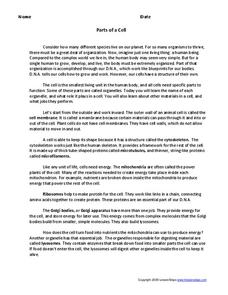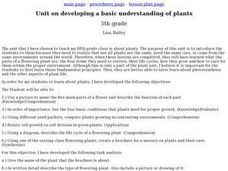Curated OER
How Do Their Parts Help Plants Survive?
In this plant survival worksheet, students will write down 3 facts about the parts of a cactus plant. Then students will write in a conclusion about how those parts help the cactus survive.
Curated OER
Parts of a Cell
Simplify the parts of a cell with this handout and brief activity. Learners read a two-page explanation of the parts of a cell that includes bolded vocabulary words. Using what they have just read, class members answer 19...
Curated OER
Nutrients for Plants and People: Reading Food Labels for Nutrition
Apply work with the food pyramid with this worksheet. Have your class go through their cupboards at home and find 5 different foods to inspect. On this handout, they record the food, what part of the food pyramid this food fits into, and...
Agriculture in the Classroom
Seed Match
Using this resource, your team of green thumbs discuss why plants are a part of a healthy diet and the different ways they are used in daily life. They then observe the characteristics of different seed as they attempt to match them with...
PreKinders
Rainforest Word Cards
Great for a science lesson or language arts activity, these picture word cards feature animals and plants that live in rainforest habitats. It includes pictures and names of rainforest residents like lemurs, monkeys, and parrots.
National Wildlife Federation
The Pollinator's Journey: Grades K-8
Bees get all the attention, but so many more creatures contribute to pollination. Scientists explore the role of pollinators as they learn about the parts of a flower and how it reproduces. They discover how plants rely on many different...
Nuffield Foundation
Investigating Transport Systems in a Flowering Plant
Some weddings have flowers in a unique, unnatural color to match the theme. Young scientists take part in this process to learn about the function of the xylem as they observe colored water moving through a flower. Then, they experiment...
Curated OER
To Eat or Not to Eat?
Young scholars identify various parts of plants and determine which parts people eat. They conduct a celery stalk experiment in which they determine the value and use of the stem, and how it helps the plant to meet its needs. Students...
Curated OER
Bread Cells
Fifth graders examine plant and animal cells. In this plant and animal cell lesson, 5th graders define what cells are, label their parts, and describe how plant and animal cells are different. They observe cells at a number of web sites,...
American Museum of Natural History
Be a Water Saver
Everyone must do their part to make a difference. The lesson link provides an 11-item questionnaire to reflect on conservation practices. Simple and straightforward, the lesson is perfect as a remote learning resource or as a tool for an...
Curated OER
The Magic School Bus Goes to Seed
Young scholars learn along with Ms. Frizzle's class. In this Magic School Bus lesson plan, students get a bugs-eye view of the flower world and find out how seeds are created, how they travel, and how they grow into plants.
Captain Planet Foundation
Which Plant Is Which?
Learn about dichotomous keys, plant identification, and how to care for the planet with a lesson plan that includes several hands-on and innovative activities. Kids go on a plant scavenger hunt and classify the plants that they find...
Curated OER
Tutti Frutti
Get some competition going in your life science class. Give lab groups a variety of plant parts, all of them fruits, except one. Their mission is to make observations, compare and contrast, in order to be the first to identify the...
Curated OER
Plants -- What Are Their Parts and Functions?
Students identify the parts of a flowering plant and their functions. They describe its life cycle as well. They compare the parts of the plant to the roles that are needed in a democracy.
Curated OER
Plants 1: Plant Parents
Students review their prior knowledge on plants. In groups, they compare and contrast the difference between reproducing asexually and sexually. Using the internet, they research how some plants can be forced to produce asexually.
Curated OER
Plants Definition Activity
In this plants definition worksheet, students choose the correct definition that match a word about plants. A reference web site is given for additional activities.
Curated OER
Plants Blackout Worksheet
In this plants worksheet, learners read the definitions of words related to plants and then write the word on the line. Students write 15 words.
Curated OER
Plants Vocabulary Crossword
In this plants crossword puzzle activity, students use a set of definition clues about plants to complete a 15 word crossword puzzle. A reference web site is given for additional activities.
Curated OER
Crops 2: What Plants Need to Grow
Students explore the kinds of things that plants need to grow well.
Curated OER
Science Quiz: Plants
In this science quiz instructional activity, students match words or phrases to their definition. Students explore topics dealing with parts of a seeds, traits of plants, and uses of seed plants. Students solve 12 multiple choice...
Curated OER
Whose Parts Do I Have? (Wings and Things)
Pupils identify an animal and a body part and then matches a body part to a specific animal. This will assess their ability to sort organisms and objects into groups according to their parts and describe how the groups are formed and...
Curated OER
Plant Systems
Second graders learn about plant systems and how plants grow and function. In this plant lesson plan, 2nd graders collect data based on roots, leaves, terrariums, plant uses, and locations of certain kinds of plants. They fill out...
Curated OER
Whose Parts Are We?
Students match roots and seeds to the plants they belong to . They comprehend how weeds spread and become established. Students match two roots with their plants. They match two seeds with their plants. Studens describe why weeds...
Curated OER
Unit on Developing a Basic Understanding of Plants
Fifth graders study the parts of a plant, their life cycles, and how to care for them in this unit.

























